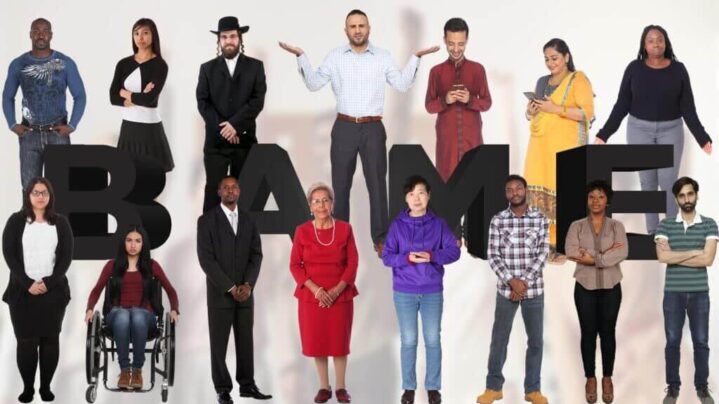
The mental health state of BAME communities
Black, Asian and Minority Ethnic (BAME) communities
In England and Wales, nearly a fifth of people come from a BAME (Black, Asian and minority ethnic) background.The mental health of BAME communities is important because people from these communities often face individual and societal challenges that can affect access to healthcare and overall mental and physical health.
It is important to note that BAME is a term that covers a wide range of people with a very diverse range of needs. Different ethnic groups have different experiences of mental health problems that reflect their culture and context.
Data collected on mental health in minority ethnic groups can often be subject to small sample sizes, meaning our ability to look at mental health within a specific ethnic group is sometimes limited.
For instance, there may be a small number of people from a certain ethnicity group taking part in a research survey. This means that there is much more we still need to know about ethnicity and mental health in the UK.
Important influences on BAME communities’ mental health
- Racism and discrimination
- Social and economic inequalities
- Mental health stigma
- Criminal justice system
- Other factors
- Racism and discrimination
People from BAME communities can experience racism in their personal lives, ranging from casual slights to explicit hurtful comments and verbal or physical aggression.
- Research suggests that experiencing racism can be very stressful and have a negative effect on overall health and mental health.
- There is a growing body of research to suggest that those exposed to racism may be more likely to experience mental health problems such as psychosis and depression.
- Social and economic inequalities
BAME communities are also often faced with disadvantages in society. They are more likely to experience poverty, have poorer educational outcomes, higher unemployment, and contact with the criminal justice system, and may face challenges accessing or receiving appropriate professional services. For example:
- Among 16 to 24 year olds, unemployment rates are highest for people from a Black background (26%) and from a Pakistani or Bangladeshi background (23%) in comparison with their White counterparts (11%).
- Even when employed, men and women from some ethnic groups are paid less on average than those from other groups with similar qualifications and experience.
- Pakistani and Bangladeshi communities consistently have high rates of poverty, as do Black, Chinese and Other ethnic communities.
- Homelessness is a key issue among minority ethnic groups, with 37% of statutory homeless households from a ‘BME background’ in 2013.
Each of these can act as risk factors for the development of mental health problems.
- Mental health stigma
Different communities understand and talk about mental health in different ways.
- In some communities, mental health problems are rarely spoken about and can be seen in a negative light. This can discourage people within the community from talking about their mental health and may be a barrier to engagement with health services.
- Criminal justice system
There is growing concern over unmet mental health needs among BAME individuals within the criminal justice system, particularly in the youth justice system.
- One 2016 report on the youth justice system in England and Wales found over 40% of children are from BAME backgrounds, and more than one third have a diagnosed mental health problem.
- The level of need may be even greater than this as it has also been found that BAME individuals are less likely to have mental health problems or learning disabilities identified upon entry to the justice system.
- Other factors
Many groups face inequalities in physical and mental health. This can be due to factors like disability, sexuality, gender and age. In order to understand different BAME communities’ experiences of mental health problems and of services provided it is also necessary to consider these other aspects in addition to race and ethnicity.
Different BAME groups and particular mental health concerns
Different BAME groups may be more likely to face particular mental health concerns. It is important to note, however, that our understanding of these mental health concerns is limited by the quality of the data collected.
Black / African / Caribbean / Black British people
- The Adult Psychiatric Morbidity Survey (APMS) found that Black men were more likely than their White counterparts to experience a psychotic disorder in the last year.
- Risk of psychosis in Black Caribbean groups is estimated to be nearly seven times higher than in the White population.
- The impact of the higher rates of mental illness is that people from these groups are more likely than average to encounter mental health services.
- Detention rates under the Mental Health Act during 2017/18 were four times higher for people in the ‘Black’ or ‘Black British’ group than those in the ‘White’ group.
- The Count Me in Census, which collects information on inpatient care, found higher than average admission and detention rates for Black groups in every year since 2006 to 2010.
- Black men were reported to have the highest rates of drug use and drug dependency than other groups.
- Whilst the White Caucasian population experienced the highest rates for suicidal thoughts, suicide rates are higher among young men of Black African, Black Caribbean origin, and among middle aged Black African, Black Caribbean and South Asian women than among their White British counterparts.
Asian/ Asian British
This term refers to people in the UK from Indian, Pakistani, Bangladeshi, Chinese and any other Asian backgrounds.
- The latest APMS found no meaningful differences between Asian people and their White British counterparts in terms of experiencing psychotic disorders or common mental health problems.
- People of Indian and Pakistani origin showed higher levels of mental wellbeing than other ethnic groups as did those of African-Caribbean origin.
- Suicidal thoughts were less common in Asian people than White British people, as was the likelihood of self-harming behaviour.
- Those identifying as Asian or Asian British are one-third less likely to be in contact with mental health or learning disability services.
- Within the South Asian community in England and Wales, research has indicated that older South Asian women seem to be an at-risk group for suicide.
- One 2018 review found that non-European immigrant women, including young South Asian women, were a high-risk group for suicide attempts.
- Findings from the last Count Me In census found that the number of people in the Asian or Asian British groups who spent time compulsorily detained in hospital rose by approximately 9% from 2005 to 2010.
- There are some studies that suggest prevalence of mental ill-health (both common mental health problems and psychotic illness) is lower among Chinese people than their White British counterparts.
- Chinese people are underrepresented in mental health services, rates of admission to mental health inpatient facilities in England and Wales were lower among the Chinese population compared to the national average. Further research is required to explore whether this is because the community experiences better mental health than the general population or if they experience specific barriers to accessing mental health services.
It is important to note that these findings may not be reflective of true prevalence of mental health problems among Asian communities in the UK as the reasons explored above may mean that people in these communities are less likely to report that they are experiencing mental health problems.
Other ethnic groups
- Irish people living in the UK have much higher hospital admission rates for mental health problems than other ethnic groups. They have higher rates of depression and alcohol problems and are at greater risk of suicide.
Comhar men’s groups
We are currently working on a project with Irish men in mid-life living in Camden. The project was developed following a piece of research in the London Boroughs of Camden and Islington that identified two particular risk factors for poor mental health and suicide: being a man in mid-life, and being born in the Republic of Ireland. The self-management courses aim to equip participants with skills and learning that will mitigate that risk.
Culturally appropriate treatment and interventions
Research points to a strong need for greatly increased cultural competency in mental health services.
This may include:
- practical improvements in language (interpreting, translating, literacy support),
- meeting faith-related and religious needs,
- culturally appropriate food,
- gender-specific services and staff,
- increasing the ethnic diversity of staff,
- and action to address and reduce experiences of racism and discrimination.
Refugees and asylum seekers
- Refugees and asylum seekers may experience exclusion, marginalisation and inequalities of access to services.
- They are more likely to experience mental health problems than the general population, including higher rates of depression, PTSD and other anxiety disorders.
- The increased vulnerability to mental health problems that refugees and asylum seekers face is linked to pre-migration experiences (such as war trauma) and post-migration conditions (such as separation from family, difficulties with asylum procedures and poor housing).
- Data shows that they are less likely to receive support than the general population.
Further information and resources
- Local Mind– a useful way of finding out what’s available in your area, such as specific BAME groups. They also have a useful information page that outlines their work in this area.
- Black Thrive– an organisation that aims to end the stigma associated with mental health and address mental health inequalities experienced by Lambeth’s Black communities
- Sharing Voices– a charity in Bradford that aims to reduce mental health and related inequalities for BAME communities.
- The Chinese Mental Health Association– an organisation that is involved in providing direct services, increasing mental health awareness and representing Chinese mental health issues in public forums and raising its profile in the overall Chinese community.



